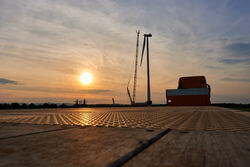News Release from WindEurope
Wind Industry Profile of
The EU built a record 17 GW of new wind energy in 2023 – wind now 19% of electricity production
According to WindEurope data, the EU built 17 GW of new wind farms in 2023: 14 GW onshore; 3 GW offshore. These numbers are slightly up on 2022 and are the most the EU has ever built in a single year. But it’s well below the 30 GW a year that the EU needs to build to meet its new 2030 climate and energy security targets.
Germany built the most new wind capacity followed by the Netherlands and Sweden. The Netherlands built the most new offshore wind, including the 1.5 GW “Hollandse Kust Zuid” – for now the world’s largest wind farm.
The IEA estimates that Europe will build 23 GW a year of new wind over 2024-28. The actions set out in the EU Wind Power Package should deliver a significant increase in the annual build-out – and strengthen Europe’s wind energy supply chain. National implementation of the actions is key.
To that end the commitment to deliver the Wind Power Package that 26 EU Energy Ministers signed before Christmas in the European Wind Charter was key. Crucial actions include the further simplification of permitting, improvements in the design of the auctions to build new wind farms and public financial support for wind turbine manufacturing and key infrastructure.
Wind was 19% of the electricity produced in the EU last year. Hydro was 13%, solar 8% and biomass 3%. Renewables in total amounted to 44% of electricity produced.
The amount of electricity produced from 1 GW of wind continued to grow. The “capacity factor” of new onshore wind farms now ranges from 30-48%, and new offshore wind is consistently 50%. The capacity factor measures how much output you get from a unit of capacity – it varies between different renewable technologies.
Wind energy in Europe: 2023 Statistics and the outlook for 2024-2030
- Source:
- WindEurope


